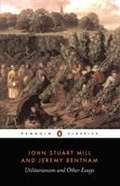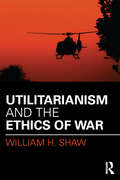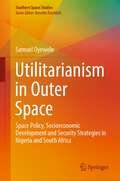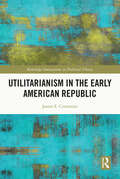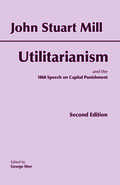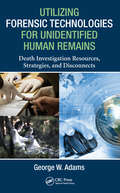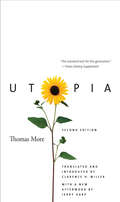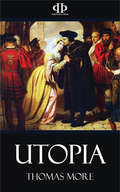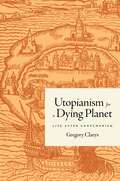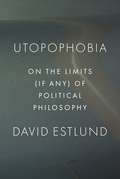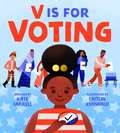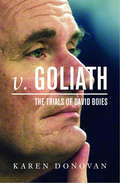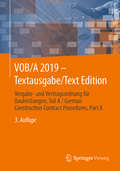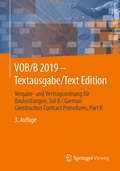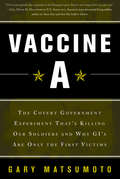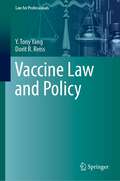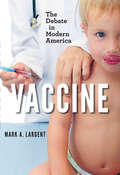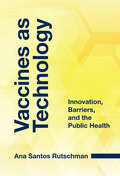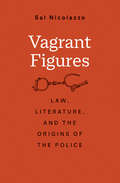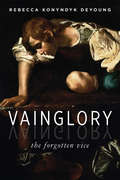- Table View
- List View
Utilitarianism and other Essays
by J. S. Mill Jeremy BenthamHundreds of bold, imaginative men--celebrities as well as everyday heroes--share here their most intimate desires, deepest fears, and most fervent cravings for renewal. Decade by decade, Sheehy uncovers the real issues facing men today: finding new passion and purpose to invigorate the second half of their lives, dealing with "manopause," surviving job change, enjoying post-nesting zest, defeating depression, and learning what keeps a man young.
Utilitarianism and the Ethics of War (War, Conflict and Ethics)
by William H. ShawThis book offers a detailed utilitarian analysis of the ethical issues involved in war. Utilitarianism and the Ethics of War addresses the two basic ethical questions posed by war: when, if ever, are we morally justified in waging war, and if recourse to arms is warranted, how are we permitted to fight the wars we wage? In addition, it deals with the challenge that realism and relativism raise for the ethical discussion of war, and with the duties of military personnel and the moral challenges they can face. In tackling these matters, the book covers a wide range of topics—from pacifism to armed humanitarian intervention, from the right of national defense to pre-emptive or preventive war, from civilian immunity to the tenets of just war theory and the moral underpinnings of the rules of war. But, what is distinctive about this book is that it provides a consistent and thorough-going utilitarian or consequentialist treatment of the fundamental normative issues that war occasions. Although it goes against the tide of recent work in the field, a utilitarian approach to the ethics of war illuminates old questions in new ways by showing how a concern for well-being and the consequences of our actions and policies shape the moral constraints to which states and other actors must adhere. This book will be of much interest to students of the ethics of war, just war theory, moral philosophy, war and conflict studies and IR.
Utilitarianism in Outer Space: Space Policy, Socioeconomic Development and Security Strategies in Nigeria and South Africa (Southern Space Studies)
by Samuel OyewoleThis book showcases Nigerian and South African experiences on space politics, policy and strategy vis-à-vis their development and security aspirations, while contributing to the broader African and the Global-South perspectives on the subject. Space policy in developing countries such as Nigeria and South Africa is motivated by utilitarian promises that space and the attendant technologies have the potential to advance development and security interests of the affected nations. However, several decades into the orbital journey of these countries, little is known of their space politics, policies, strategies, capacities and capabilities, and realisation of desired objectives. Beyond pure and applied sciences reductionism, this book offers social science perspectives on space studies in Africa, as it examines the intricate relationships of historical, geographical, social, demographic, economic, political, administrative, and strategic factors, nationally, regionally and globally that have shaped research and development of space science and technologies, and their benefits, in Nigeria and South Africa.
Utilitarianism in the Early American Republic (Routledge Innovations in Political Theory)
by James E. CrimminsIn Utilitarianism in the Early American Republic James E. Crimmins provides a fresh perspective on the history of antebellum American political thought. Based on a broad-ranging study of the dissemination and reception of utilitarian ideas in the areas of constitutional politics, law education, law reform, moral theory and political economy, Crimmins illustrates the complexities of the place of utilitarianism in the intellectual ferment of the times, in both its secular and religious forms, intersection with other doctrines, and practical outcomes. The pragmatic character of American political thought revealed—culminating in the postbellum rise of Pragmatism—stands in marked contrast to the conventional interpretations of intellectual history in this period. Utilitarianism in the Early American Republic will be of interest to academic specialists, and graduate and senior undergraduate students engaged in the history of political thought, moral philosophy and legal philosophy, particularly scholars with interests in utilitarianism, the trans-Atlantic transfer of ideas, the American political tradition and modern American intellectual history.
Utilitarianism: and the 1868 Speech on Capital Punishment (Hackett Classics)
by John Stuart MillThis expanded edition of John Stuart Mill's Utilitarianism includes the text of his 1868 speech to the British House of Commons defending the use of capital punishment in cases of aggravated murder. The speech is significant both because its topic remains timely and because its arguments illustrate the applicability of the principle of utility to questions of large-scale social policy.
Utilizing Forensic Technologies for Unidentified Human Remains: Death Investigation Resources, Strategies, and Disconnects
by George W. AdamsIn missing and unidentified investigations, an abyss of dissonance seems to exist between law enforcement and the community they serve that all too often creates grating wounds that may never heal. Utilizing Forensic Technologies for Unidentified Human Remains: Death Investigation Resources, Strategies, and Disconnects bridges this abyss.This is th
Utopia
by Thomas More Clarence H. Miller Jerry HarpSaint Thomas More's Utopia is one of the most important works of European humanism and serves as a key text in survey courses on Western intellectual history, the Renaissance, political theory, and many other subjects. Preeminent More scholar Clarence H. Miller does justice to the full range of More's rhetoric in this masterful translation. In a new afterword to this edition, Jerry Harp contextualizes More's life and Utopia within the wider frames of European humanism and the Renaissance."Clarence H. Miller's fine translation tracks the supple variations of More's Latin with unmatched precision, and his Introduction and notes are masterly. Jerry Harp's new Afterword adroitly places More's wonderful little book into its broader contexts in intellectual history."--George M. Logan, author of The Meaning of More's "Utopia""Sir Thomas More's Utopia is not merely one of the foundational texts of western culture, but also a book whose most fundamental concerns are as urgent now as they were in 1516 when it was written. Clarence H. Miller's wonderful translation of More's classic is now happily once again available to readers. This is the English edition that best captures the tone and texture of More's original Latin, and its notes and introduction, along with the lively afterward by Jerry Harp, graciously supply exactly the kinds of help a modern reader might desire."--David Scott Kastan, Yale University
Utopia
by Thomas MoreDesignedly fantastic in suggestion of details, “Utopia” is the work of a scholar who had read Plato’s “Republic,” and had his fancy quickened after reading Plutarch’s account of Spartan life under Lycurgus. Beneath the veil of an ideal communism, into which there has been worked some witty extravagance, there lies a noble English argument.
Utopianism for a Dying Planet: Life after Consumerism
by Gregory ClaeysHow the utopian tradition offers answers to today’s environmental crisesIn the face of Earth’s environmental breakdown, it is clear that technological innovation alone won’t save our planet. A more radical approach is required, one that involves profound changes in individual and collective behavior. Utopianism for a Dying Planet examines the ways the expansive history of utopian thought, from its origins in ancient Sparta and ideas of the Golden Age through to today's thinkers, can offer moral and imaginative guidance in the face of catastrophe. The utopian tradition, which has been critical of conspicuous consumption and luxurious indulgence, might light a path to a society that emphasizes equality, sociability, and sustainability.Gregory Claeys unfolds his argument through a wide-ranging consideration of utopian literature, social theory, and intentional communities. He defends a realist definition of utopia, focusing on ideas of sociability and belonging as central to utopian narratives. He surveys the development of these themes during the eighteenth and nineteenth centuries before examining twentieth- and twenty-first-century debates about alternatives to consumerism. Claeys contends that the current global warming limit of 1.5C (2.7F) will result in cataclysm if there is no further reduction in the cap. In response, he offers a radical Green New Deal program, which combines ideas from the theory of sociability with proposals to withdraw from fossil fuels and cease reliance on unsustainable commodities.An urgent and comprehensive search for antidotes to our planet’s destruction, Utopianism for a Dying Planet asks for a revival of utopian ideas, not as an escape from reality, but as a powerful means of changing it.
Utopophobia: On the Limits (If Any) of Political Philosophy
by David EstlundA leading political theorist’s groundbreaking defense of ideal conceptions of justice in political philosophyThroughout the history of political philosophy and politics, there has been continual debate about the roles of idealism versus realism. For contemporary political philosophy, this debate manifests in notions of ideal theory versus nonideal theory. Nonideal thinkers shift their focus from theorizing about full social justice, asking instead which feasible institutional and political changes would make a society more just. Ideal thinkers, on the other hand, question whether full justice is a standard that any society is likely ever to satisfy. And, if social justice is unrealistic, are attempts to understand it without value or importance, and merely utopian?Utopophobia argues against thinking that justice must be realistic, or that understanding justice is only valuable if it can be realized. David Estlund does not offer a particular theory of justice, nor does he assert that justice is indeed unrealizable—only that it could be, and this possibility upsets common ways of proceeding in political thought. Estlund engages critically with important strands in traditional and contemporary political philosophy that assume a sound theory of justice has the overriding, defining task of contributing practical guidance toward greater social justice. Along the way, he counters several tempting perspectives, including the view that inquiry in political philosophy could have significant value only as a guide to practical political action, and that understanding true justice would necessarily have practical value, at least as an ideal arrangement to be approximated.Demonstrating that unrealistic standards of justice can be both sound and valuable to understand, Utopophobia stands as a trenchant defense of ideal theory in political philosophy.
V Is for Voting
by Kate Farrell"This playful, though powerful book engages little readers in the tenants of democracy and activism through rhyming text and colorful works of art." —PBS Kids for Parents "An ideal starting point in helping kids to understand elections and voting." —Today.com V Is for Voting is an ABC book that introduces progressive families to concepts like social justice and civil rights and reminds readers that every vote counts!A is for active participation.B is for building a more equal nation.C is for citizens' rights and our duty.D is for difference, our strength and our beauty.An engaging introduction to the tenets of democracy, V Is for Voting is a playful, poetic, and powerful primer about the importance of voting and activism. Featuring Kate Farrell’s rhyming text and Caitlin Kuhwald’s bold art, plus thoughtful back matter, the book is a gorgeous, and crucial, addition to every young reader’s library. It makes the perfect gift for fans of A Is for Activist, Woke Baby, and Feminist Baby."This ABC-style children's book reinforces every element from A to Z of just how powerful one vote can be." —Romper
V. Goliath: The Trials of David Boies
by Karen DonovanDavid Boies, the star trial lawyer in a country obsessed with legal drama, proves endlessly fascinating in this compulsively readable account of his extraordinary career. A man of almost superhuman accomplishment, Boies argued a string of headline-making cases before being catapulted to international prominence when he represented Al Gore before the Supreme Court in Bush v. Gore. Brash, reckless, and prideful, he is also charming, charismatic, unerringly articulate in the courtroom, and supremely comfortable in the public eye. Legal journalist Karen Donovan, herself a lawyer, had unprecedented access to Boies for nearly two years. In v. Goliath she gives us a scintillating chronicle of the legal dramas in which Boies has played a crucial role and a riveting, up-close portrait of a singularly gifted lawyer.
VBER 2022: Digital, Dual, Exclusive and Selective Distribution plus Franchising (Law for Professionals)
by Benedikt RohrßenThis book tackles the Vertical Block Exemption Regulation ("VBER"). The VBER 2022 is the new playbook in Europe for vertical agreements. Vertical agreements, i.e. between parties from different levels of the production or distribution chain, are ubiquitous in the EU economy. Vertical agreements which appreciably restrict competition are, in principle, void, and subject to fines. By exception, agreements may already fall outside the scope of competition law or may be exempt if their pro-competitive effects prevail. Whether they do or not requires an individual assessment of each agreement, with respective legal uncertainty. The VBER, however, is the shortcut to legally certain vertical agreements because it exempts groups of vertical agreements from the prohibition of anti-competitive agreements. It therefore builds the practical core of distribution law. Only understanding and implementing the VBER ensures a compliant distribution set-up. This goes for all kinds of vertical agreements, especially: digital, dual, exclusive and selective distribution plus franchise. The VBER 2022 is intended to take into account market developments, in particular the strong growth in e-commerce. Digitalisation has reinforced the trend toward verticalization – and thus toward dual distribution. The VBER 2022 now "reboots" the existing playbook, making it fit for digital distribution. And this book shall help – as a shortcut to understanding the VBER – to quickly and easily pass the transition to the new rules. This book is written from the distribution / contract drafting perspective. It is born out of the author’s practice as German attorney-at-law and partner in the international law firm Taylor Wessing. This book aims at providing private practitioners, in-house counsels as well as officers within authorities and judges practical guidance on the “rebooted” competition law regime in the European Union, including many examples of provisions to be used, especially in distribution and franchise agreements. It also tables and checklists for creating new and adapting existing agreements to the VBER. This book has been written while accompanying the reform discussions and the introduction of the VBER 2022 as an author, speaker and private practitioner.
VOB/A 2019 - Textausgabe/Text Edition: Vergabe- und Vertragsordnung für Bauleistungen, Teil A / German Construction Contract Procedures, Part A
by Springer Fachmedien WiesbadenDiese zweisprachige Ausgabe der aktuellen VOB/A erleichtert den Dialog bei der Auftragsvergabe. Das Interesse an den Inhalten der VOB ist auch im Ausland groß. In den meisten Ländern gibt es keine vergleichbare Verordnung, um Aufträge zu vergeben, solide Bauverträge abzuschließen und verlässliche bauvertragliche Abmachungen zu vereinbaren.
VOB/B 2019 - Textausgabe/Text Edition: Vergabe- und Vertragsordnung für Bauleistungen, Teil B / German Construction Contract Procedures, Part B
by Springer Fachmedien WiesbadenDiese zweisprachige Ausgabe der aktuellen VOB/B erleichtert den Dialog bei der Auftragsvergabe. Das Interesse an den Inhalten der VOB ist auch im Ausland groß. In den meisten Ländern gibt es keine vergleichbare Verordnung, um Aufträge zu vergeben, solide Bauverträge abzuschließen und verlässliche bauvertragliche Abmachungen zu vereinbaren.
VOB/B nach Ansprüchen
by Christian ZannerDas Fachbuch vermittelt in allgemein verständlicher Form die Grundkenntnisse der VOB/B und gibt Sicherheit bei der Durchsetzung und Abwehr von Ansprüchen aller am Bau Beteiligten während der Bauabwicklungsphase und der sich anschließenden Mängelhaftung. Das Buch ist das ideale Hilfsmittel auf jeder Baustelle. Durch den Aufbau des Werkes nach Ansprüchen kann es in der Praxis als Nachschlagewerk für einzelne Situationen herangezogen werden. Die 6. Auflage berücksichtigt die aktuelle Rechtsprechung und die neuen Regelungen der VOB/B 2016, die am 18.04.2016 in Kraft getreten ist.
VOB/B nach Ansprüchen: Entscheidungshilfen für Auftraggeber, Planer und Bauunternehmen (Bau- und Architektenrecht nach Ansprüchen)
by Christian ZannerDas Fachbuch vermittelt in allgemein verständlicher Form alle wichtigen Kenntnisse zur VOB/B und dem Baurecht im BGB. Es gibt Sicherheit bei der Durchsetzung und Abwehr von Ansprüchen aller am Bau Beteiligten während der Bauabwicklungsphase und der sich anschließenden Mängelhaftung. Das Fachbuch ist das ideale Hilfsmittel auf jeder Baustelle. Durch den Aufbau des Werkes nach Ansprüchen kann es in der Praxis als Nachschlagewerk für einzelne Situationen herangezogen werden. Die 7. Auflage berücksichtigt die aktuelle Rechtsprechung und die neuen Regelungen zum Baurecht im BGB, die am 01.01.2018 in Kraft getreten sind.
Vacant Possession: Law And Practice
by Keith ShawVacant possession is an element of property law that ensures a property is left in good condition when it changes hands. Every time a property is sold, or if tenants move out of rented property, vacant possession is unavoidable; a vital part of the job of any property lawyer or surveyor. Yet this is the first book to look at this area in depth. If a property professional understands vacant possession they can make sure their cases move quickly and complete at a time that suits them. If they do not, they are vulnerable to others who know it better and can use the law to frustrate proceedings for months or even years while their clients continue to pay money on rent or mortgage payments for properties they're not using. This book is essential reading for all property lawyers and surveyors. It is destined to be the definitive guide to vacant possession.
Vaccine A: The Covert Government Experiment That's Killing Our Soldiers -- and Why GI's Are Only the First Victims
by Gary MatsumotoIn this provocative look at the US military from the Persian Gulf War through the 2003 invasion of Iraq, investigative journalist Gary Matsumoto contends that an anthrax vaccine dispensed by the Department of Defense was the cause of Gulf War Syndrome and the origins of a massive cover-up. Matsumoto calls it the worst friendly-fire incident in military history. A skillfully-woven narrative that serves as a warning about this man-made epidemic, Vaccine A is a much needed account of just what went wrong, and why.
Vaccine Court: The Law and Politics of Injury
by Anna KirklandA behind-the-scenes examination of the special court dedicated to claims that vaccines have caused harmThe so-called vaccine court is a small special court in the United States Court of Federal Claims that handles controversial claims that a vaccine has harmed someone. While vaccines in general are extremely safe and effective, some people still suffer severe vaccine reactions and bring their claims to vaccine court. In this court, lawyers, activists, judges, doctors, and scientists come together, sometimes arguing bitterly, trying to figure out whether a vaccine really caused a person’s medical problem. In Vaccine Court, Anna Kirkland draws on the trials of the vaccine court to explore how legal institutions resolve complex scientific questions. What are vaccine injuries, and how do we come to recognize them? What does it mean to transform these questions into a legal problem and funnel them through a special national vaccine court, as we do in the US? What does justice require for vaccine injury claims, and how can we deliver it? These are highly contested questions, and the terms in which they have been debated over the last forty years are highly revealing of deeper fissures in our society over motherhood, community, health, harm, and trust in authority. While many scholars argue that it’s foolish to let judges and lawyers decide medical claims about vaccines, Kirkland argues that our political and legal response to vaccine injury claims shows how well legal institutions can handle specialized scientific matters. Vaccine Court is an accessible and thorough account of what the vaccine court is, why we have it, and what it does.
Vaccine Law and Policy (Law for Professionals)
by Y. Tony Yang Dorit R. ReissVaccine Law and Policy is the first book on vaccine law and policy written specifically for the general public or an educated lay audience without legal background. It offers comprehensive but accessible coverage of key aspects of vaccine law and policy, from product development and intellectual property protections, to regulation, public mandates, and vaccine injury claims. The COVID-19 pandemic sparked a growing interest in learning more about vaccine law and policy, as vaccine development, access, safety and requirements became relevant to hundreds of millions of people worldwide. This book covers United States law in most detail, but the developments and trends described have parallels in many countries, and the United States model and its actions influence others. Some of the most widely used vaccines against COVID-19 - mRNA vaccines – were developed in the United States, and choices made in the United States impact other countries.United States law currently has so much to say about vaccines. From the federal mandate President Biden enacted requiring federal employees to be vaccinated against COVID-19, to the growing number of private employers requiring vaccines to return to work, vaccine law has become a prevalent topic in everyday life. But there is little writing about the legal aspects of vaccines directed at the general public or an educated lay audience without a legal background. Vaccine Law and Policy will not only be invaluable to professionals implementing vaccine law and policy, but also to regulators, public health officials, and scientific researchers.Vaccine Law and Policy covers the wide range of laws and policies that impact the field. These include, among others, regulatory oversight by the FDA, one of the most influential bodies in drug and vaccines regulation worldwide, enforcement, and regulation of the research and development of vaccines; vaccine mandates for children and in the workplace, and medical, religious, and philosophical exemptions to them; patent law and other intellectual property protections such as trademark, trade secret, unfair competition, and copyright law; compensation for vaccine injuries under the National Vaccine Injury Compensation Program (NVICP) and other avenues of liability; safety monitoring; access to vaccines, their promotion, and issues related to funding and costs. The book will also discuss issues related to anti-vaccine movements and vaccine advocacy.
Vaccine: The Debate in Modern America
by Mark A. LargentA thoughtful evaluation of the vaccine debate, its history, and its consequences.Since 1990, the number of mandated vaccines has increased dramatically. Today, a fully vaccinated child will have received nearly three dozen vaccinations between birth and age six. Along with the increase in number has come a growing wave of concern among parents about the unintended side effects of vaccines. In Vaccine, Mark A. Largent explains the history of the debate and identifies issues that parents, pediatricians, politicians, and public health officials must address.Nearly 40% of American parents report that they delay or refuse a recommended vaccine for their children. Despite assurances from every mainstream scientific and medical institution, parents continue to be haunted by the question of whether vaccines cause autism. In response, health officials herald vaccines as both safe and vital to the public's health and put programs and regulations in place to encourage parents to follow the recommended vaccine schedule.For Largent, the vaccine-autism debate obscures a constellation of concerns held by many parents, including anxiety about the number of vaccines required (including some for diseases that children are unlikely ever to encounter), unhappiness about the rigorous schedule of vaccines during well-baby visits, and fear of potential side effects, some of them serious and even life-threatening. This book disentangles competing claims, opens the controversy for critical reflection, and provides recommendations for moving forward.
Vaccines as Technology: Innovation, Barriers, and the Public Health
by Ana Santos RutschmanThe COVID-19 pandemic served as a powerful wake-up call, highlighting our collective need for the effective development and equitable distribution of new vaccines, in addition to widespread administration of existing ones. The current models of production and allocation of vaccines against emerging pathogens, which rely on predominantly market-driven mechanisms, are largely at odds with public health needs. This book is the first to explore the entire arc of vaccine development and distribution, from the decisions about allocation of vaccine R&D money to allocation and administration of vaccines resulting from the R&D process. It explains key concepts and problems in vaccine regulation, intellectual property, technology transfer, and international relations, making complex material accessible to a non-specialist audience. Analyzing the impact of COVID-19, the book also covers several other vaccine races, as well as future directions in vaccine development and allocation.
Vagrant Figures: Law, Literature, and the Origins of the Police (The Lewis Walpole Series in Eighteenth-Century Culture and History)
by Sal NicolazzoHow vagrancy, as legal and imaginative category, shaped the role of policing in colonialism, racial formation, and resource distribution In this innovative book demonstrating the important role of eighteenth-century literary treatments of policing and vagrancy, Nicolazzo offers a prehistory of police legitimacy in a period that predates the establishment of the modern police force. She argues that narrative, textual, and rhetorical practices shaped not only police and legal activity of the period, but also public conceptions of police power. Her extensive research delves into law and literature on both sides of the Atlantic, tracking the centrality of vagrancy in establishing police power as a form of sovereignty crucial to settler colonialism, slavery, and racial capitalism. The first book in several generations to address policing and vagrancy in the eighteenth century, and the first in the field to center race and empire in its account of literary vagrancy, Nicolazzo&’s work is a significant contribution to the field of eighteenth-century literary and cultural studies.
Vainglory: The Forgotten Vice
by Rebecca Konyndyk DeYoungJulia Roberts on the red carpet at the Oscars. Lady Gaga singing “Applause” to worshipful fans at one of her sold-out concerts. And you and me in our Sunday best in the front row at church. What do we have in common?Chances are, says Rebecca Konyndyk DeYoung, that we all suffer from vainglory -- a keen desire for attention and approval. Although contemporary culture has largely forgotten about vainglory, it was on the original list of seven capital vices and is perhaps more dangerous than ever today.In Vainglory: The Forgotten Vice DeYoung tells the story of this vice, moving from its ancient origins to its modern expressions. She defines vainglory, gives examples from popular culture, explores motivational sources, and discusses other vices associated with it such as hypocrisy and boasting. After exposing the many ways in which vainglory can rear its ugly head, she explores personal spiritual practices that can help us resist it and community practices that can help us handle glory well.
